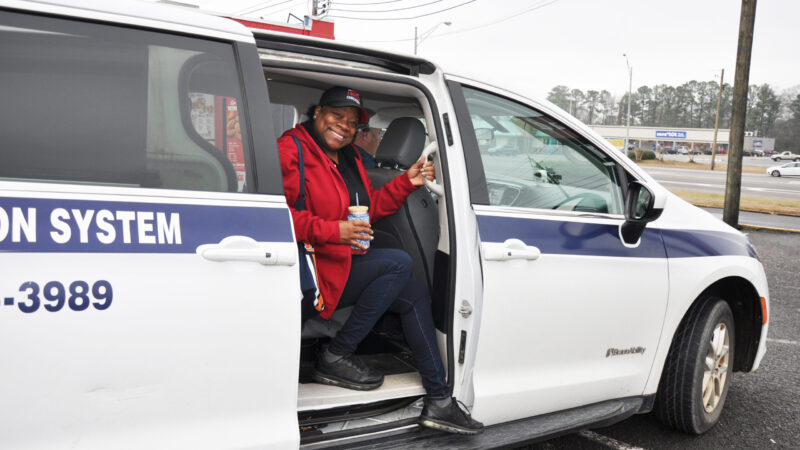Alabama and the Oil Spill: One Family’s Story
The explosion of the Deepwater Horizon oil rig in the Gulf of Mexico is wreaking widespread environmental havoc. But there’s a very personal chaos playing out in thousands of homes up and down the coastline. The oil spill has put many people out of work, and as WBHM’s Tanya Ott reports many families are being forced to rethink their financial lives.
It’s Friday morning and Tracy Thrasher quietly scrambles to make the beds in a vacation home in Gulf Shores, Alabama. Tourists are in town for a music festival and they need somewhere to stay.
“I’m doing a rush job because they’re already here and they’re wanting to rent the house, so I have to run in and try to get it as clean as I can.”
Tracy’s just happy to have the work. She cleans vacation rental homes, but since the oil rig exploded last month, tourists have been canceling their vacations all the way through July. Tracy’s worked just two days in the last three weeks. Her income has gone from $800 a week to just $100. Her husband Kelly is a building contractor who depends on vacation rentals for most of his business. He says their financial well is running dry.
“Normally this time of year I’m working seven days a week around the clock. You know. And just like today I get a half a day. It’s just not happening. People ain’t coming.”
And they may not for a while.
“I and you both know right now there’s no oil on these beaches. You know. But the people’s not here. How do you tell them that there’s no oil on the beaches? I mean, you can’t. They don’t believe it.”
The Thrashers can’t believe their bad luck. In 2004, Hurricane Ivan’s high winds and surf devastated this part of Alabama. Hurricane Katrina hit the following year. And before the region had time to recover, Tracy Thrasher says they were hit with a third stroke of bad luck: the mortgage crisis.
“Most definitely stress, stress all the way around.”
Insurance companies delayed their payments to people whose homes were damaged in the Hurricanes. That, along with the housing crash, meant Kelly couldn’t find much work. The Thrashers burned through $12,000 in savings in just a few years. Tracy took a job cleaning rental homes this spring. Sometimes Kelly helps out.
“Extra cash, we need more money with the economy the way it is, nobody’s doing any construction work, so we figured we’d start cleaning houses.”
Kelly sold his two precious motorcycles. Tracy loved going to the movies. They don’t anymore. They started renting videos, but the only place in town recently closed. The Thrashers have also sliced and diced the food budget.
“Instead of spending $100 for the week you go and spend $40 for the week. Sandwiches instead of steaks!”
Emily, their fourth grade daughter, is a voracious reader. She loves Japanese comic books called Manga. She used to feed her addiction with frequent visits to Books a Million. But now she has to rely on the library.
“It feels kind of sad because there’s like this one Manga that I really want to have, but I can’t have it. They don’t have Mangas in the library at school.”
“Oh, it’s soo hard!” says Tracy Thrasher. “How do you explain to a 9 year old that we need to cut back?”
“Uh, I’m sorry,” she says with a sigh. “Allowance maybe next week.”
Or maybe not, since there is nothing to fall back on. Kelly Thrasher has always been self-employed and never saved for retirement. “Those are things for rich corporate-type people”, he says.
Applying to British Petroleum for reimbursement of lost income won’t help much. BP wants two years worth of tax returns, but Tracy’s only been cleaning houses for a few months. And Kelly? Well, he admits he does a lot of work for cash.
“I guess you pull out the newspaper and start looking for another job!”
Kelly’s already lined up a job 300 miles north in Birmingham. It’s a quick, one-time gig that pays a couple thousand dollars. But subtract the gas and a motel for him and his crew, and Kelly says there will be little left over.
This tragedy in the Gulf may prompt some families to change their financial lives. But for this family, and probably many others, that’s just not possible.
Kalshi reveals insider trading case against editor for MrBeast
With prediction markets booming, so have concerns about insider trading. Now, Kalshi has disclosed its first public actions against accounts suspected of trading on confidential information.
Greetings from Jordan’s Wadi Rum desert, where patches of green emerge after winter rains
Wadi Rum's otherworldly landscape is where Star Wars movies and The Martian were filmed. In late winter, plants emerge in this desert — but some are toxic to camels, so their herders must protect them.
Lack of transportation keeps many Alabamians from working. Rural public transit programs are trying to help
While lack of transportation is a major employment barrier in Alabama, few people take public transit to work. That dynamic is even more pronounced in rural areas.
When a horse whinnies, there’s more than meets the ear
A new study finds that horse whinnies are made of both a high and a low frequency, generated by different parts of the vocal tract. The two-tone sound may help horses convey more complex information.
Hundreds of American nurses choose Canada over the U.S. under Trump
More than 1,000 American nurses have successfully applied for licensure in British Columbia since April, a massive increase over prior years.
Trump’s many tariff tools mean consumer prices won’t go down, analysts say
The Supreme Court struck down President Trump's signature tariffs. But the president has other tariff tools, and consumers shouldn't expect cheaper prices anytime soon, economists say.






